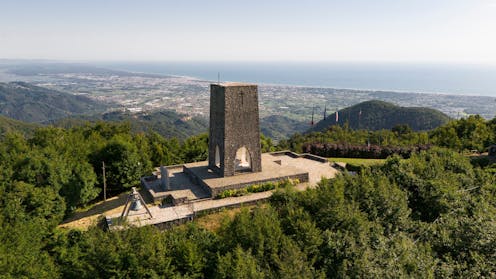The enduring anti-fascist legacy of places that mark Italy’s wartime resistance – podcast
A memorial in the town of Stazzema in Italy, site of a brutal Nazi massacre in 1944. Federico Neri/Shutterstock
Across Europe, far-right movements are gaining ground. From the Netherlands, to Germany and Italy, they’re winning seats in parliaments and sometimes joining ruling coalitions. By normalising nationalist rhetoric and challenging democratic institutions, these parties raise comparisons with former periods of fascism on the continent.
Between 1943 and 1945, when Nazi forces occupied northern Italy, ordinary people in towns and villages across the country took up arms against fascism in one of Europe’s largest resistance movements. Now, 80 years later, in many of these same towns, anti-fascist sentiment remains unusually strong.
In this episode of The Conversation Weekly podcast, we speak to political scientist Juan Masullo at Leiden University, who’s been finding out about the enduring legacy of these anti-fascist movements.
The town of Sant’Anna di Stazzema, tucked away in the mountains of Tuscany, is a place haunted by its wartime past. The site of a notorious Nazi massacre during the Italian civil war it’s become a memorial to Italian resistance, and what Massulo describes as a “bastion of anti-fascist, left-wing progressive thinking”.
In 2021, the mayor of Stazzema began collecting signatures from around Italy to a petition calling for a ban on every form of fascist or neo-fascist propaganda. It needed 50,000 signatures to be discussed in parliament, and 240,000 signed it.
Masullo saw this as an opportunity to answer a question about political resistance and its legacy: was there an association between places with a lot of anti-fascist resistance during the war, and places that supported the petition? “We did find out that there was an association,” he told us. And when he began interviewing people in places where the correlation was particularly strong to try and find out why, he said “ these people spend a lot of time memorialising what happened”.
Listen to the full episode of The Conversation Weekly to hear our conversation with Juan Masullo about his research.
This episode of The Conversation Weekly was written and produced by Mend Mariwany with mixing and sound design by Eloise Stevens and theme music by Neeta Sarl. Gemma Ware is the executive producer.
Newsclips in this episode from DW News, BBC News, BattleForTelenuovo, Hindustan Times, Look in the Past War Archives, Archivio Luce Cinecittà, Tele Liguria Sud.
Listen to The Conversation Weekly via any of the apps listed above, download it directly via our RSS feed or find out how else to listen here. A transcript of this episode is available on Apple Podcasts or Spotify.
Juan Masullo has received funding for this research from UNUWIDER and Leiden University. He is affiliated with the University of Milan.



